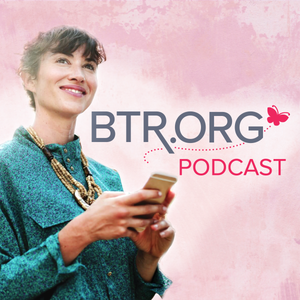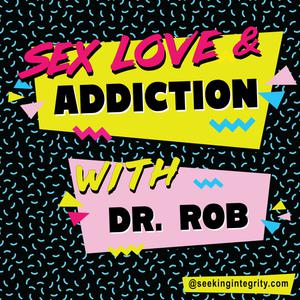
From Betrayal To Breakthrough
Dr. Debi Silber
Tips, tools, and strategies to heal from betrayal physically, mentally, and emotionally
- 29 minutes 45 seconds404: Breaking Free: Understanding Trauma Bonds
Episode Summary: In this eye-opening episode, Dr. Nadine Macaluso, renowned therapist and trauma expert, shares her journey of overcoming a toxic relationship with "The Wolf of Wall Street" and explains the dynamics of trauma bonds. Together, we explore how these relationships form, why they’re so difficult to leave, and actionable steps for breaking free and rebuilding your life. Dr. Nae offers profound insights, practical strategies, and hope for anyone trapped in a trauma bond. Key Topics Covered: 1. Dr. Nadine’s Personal Journey Married to the infamous “Wolf of Wall Street,” Jordan Belfort, and the realities behind the glamour depicted in the movie. Her experience with love bombing, coercion, abuse, and the eventual breaking point that led her to leave. How her journey inspired her to become a therapist specializing in trauma and toxic relationships. 2. What Is a Trauma Bond? A toxic, dysfunctional relationship characterized by power imbalance and cycles of intermittent reinforcement (e.g., love bombing followed by abuse). Key conditions: One partner seeks control while the other becomes emotionally attached despite the harm. The confusing mix of highs and lows that keeps people trapped in these relationships. 3. Recognizing a Trauma Bond Signs of a trauma bond: self-sacrifice, self-abandonment, and rationalizing abusive behavior. The importance of radical acceptance and recognizing the reality of the relationship. Dispelling the myth that the victim is at fault for the abuse. 4. Breaking Free from a Trauma Bond The importance of having a plan before leaving: gather financial, legal, and personal resources. Learning to “wear the mask” and act normal while preparing your exit. Why reaching out for support and building resilience in a safe community is critical. 5. Rebuilding Your Life After Leaving Turning the focus inward: rediscovering who you are, addressing developmental trauma, and strengthening your self-worth. The role of self-care, therapy, and community in stabilizing after a trauma bond. Embracing the healing journey as an opportunity to create a life you love. 6. Dr. Nae’s Advice for Healing Abuse is never the victim’s fault, and healing is possible for everyone. The importance of recognizing the impulse to heal and following it step by step. Building new neural pathways to replace patterns of shame and self-blame with empowerment. Key Takeaways: Trauma bonds are rooted in control and manipulation, not love. Recognizing the reality of the relationship is the first step to breaking free. Healing requires a plan, support, and the willingness to prioritize your self-care and growth. The power to rebuild your life lies within you, and a brighter, healthier future is possible. Resources Mentioned: Dr. Nadine’s Website: DrNae.com Free assessments and resources, including a trauma bond assessment. Dr. Nadine on Social Media: Instagram: @NadineMacaluso TikTok: @DrNaeLMFT Dr. Nadine’s Book: Run Like Hell Available on her website and Amazon. Subscribe to the PBT Institute’s resources for more on healing from betrayal and transforming your life! The PBT Institute: Break free from the pain of betrayal and find safety, love, and trust again. For the betrayed – Reclaim: Heal from your betrayal and take your life back. For the betrayer – Rebuild: Heal yourself and help heal the heart you broke. Take the Post Betrayal Syndrome Quiz – Post-Betrayal Syndrome Quiz Want to become a Certified PBT Coach/Practitioner? Check out our FREE masterclass here. Closing Message: If you’re in a trauma bond or recovering from one, know that healing is possible. With the right support, resources, and inner work, you can rebuild a life filled with freedom, strength, and love. Follow Dr. Nadine for more insights and take that first step toward your breakthrough today.
20 January 2025, 9:00 am - 28 minutes 43 seconds403: The Link Between Betrayal and Fatigue: How to Regain Energy and Improve Sleep
-
Episode Summary: In this episode, Dr. Evan Hirsch, a world-renowned expert on fatigue and sleep, joins us to explore the profound connection between betrayal trauma and chronic fatigue. Together, we uncover why betrayal wreaks havoc on your energy, hormones, and sleep patterns—and, most importantly, what you can do to start feeling like yourself again. If you're feeling exhausted, foggy-headed, or unable to sleep after betrayal, this episode is a must-listen.
-
Key Topics Covered:
-
1. The Science Behind Fatigue and Betrayal
-
How betrayal trauma creates stress that damages the mitochondria (your body's energy producers) and disrupts your hormones, particularly cortisol.
-
The cascading effects of chronic stress on your sleep cycle, immune system, and overall health.
-
Why betrayal often leads to feelings of extreme fatigue and "walking through mud."
-
2. Acute Fatigue vs. Chronic Fatigue
-
The difference between temporary fatigue caused by lack of sleep and chronic fatigue that persists for months.
-
Signs that your fatigue has become a chronic issue requiring deeper intervention.
-
3. The Impact of Poor Sleep on Your Health
-
The relationship between sleep deprivation and weakened immune function, inability to detoxify, and hormonal imbalances.
-
Why sleep is essential for brain health—your brain shrinks by 60% during sleep to "wring out" toxins.
-
The link between poor sleep and weight issues, accelerated aging, and blood sugar dysregulation.
-
4. Dr. Evan Hirsch's Four-Step Approach to Fatigue Recovery:
-
Identify Root Causes:
-
The "Toxic Five" that lead to chronic fatigue: heavy metals, chemicals, mold, infections, and trauma like betrayal.
-
Replace Deficiencies (check with your doctor first):
-
Boosting key hormones and nutrients (e.g., cortisol, thyroid, progesterone, B12) to restore balance and recreate a healthy circadian rhythm.
-
Open Detox Pathways:
-
Supporting liver, kidney, and lymphatic drainage to help your body eliminate toxins effectively.
-
Remove the "Toxic Five":
-
Gradually addressing heavy metals, molds, and other underlying toxins to support long-term healing.
-
Practical Tips for Improving Sleep and Energy:
-
Start with mindset work: Reframe limiting beliefs and focus on empowering questions like, “How can I love myself more today?”
-
Use simple breathing techniques and nervous system retraining to move out of fight-or-flight mode into rest-and-digest.
-
Focus on small lifestyle changes: hydration, proper nutrition, and gentle movement if you're too fatigued for rigorous exercise.
-
Remember that healing takes time—especially when addressing deeper toxic burdens alongside trauma recovery.
-
How Fatigue Affects Other Areas of Your Life:
-
Brain Fog: A lack of sleep and mitochondrial dysfunction contribute to difficulty focusing and thinking clearly.
-
Hormonal Imbalances: Chronic stress compromises adrenal and sex hormone function, worsening symptoms like fatigue, weight gain, and disrupted cycles.
-
Accelerated Aging: Stress and hormonal imbalances lead to wrinkles, loss of elasticity, and other signs of aging—but healing can reverse these effects.
-
Key Takeaways:
-
Betrayal trauma sets off a cascade of stress responses that deplete your energy and disrupt your sleep.
-
Addressing root causes—hormonal imbalances, toxic burdens, and nervous system dysregulation—is essential for long-term recovery.
-
Small, actionable steps like mindset shifts, proper nutrition, and breathwork can help you start regaining control and energy today.
-
Resources Mentioned:
-
Dr. Evan Hirsch’s Website: EnergyMDMethod.com
-
Masterclass: Learn more about Dr. Hirsch’s approach to addressing fatigue and sleep issues.
-
The PBT Institute: Explore programs designed to help you heal from betrayal and rebuild your energy and life.
-
Connect with Us:
-
Visit The PBT Institute for resources to move from betrayal to breakthrough.
-
Check out Dr. Hirsch’s previous masterclass inside The PBT Institute for more insights on improving sleep and energy.
-
Closing Message: Healing from betrayal and regaining your energy is possible. Take the first step toward restorative sleep and vibrant health by addressing the root causes of your fatigue. Together, we can help you reclaim your power and move toward breakthrough.
13 January 2025, 9:00 am -
- 19 minutes 9 seconds402: 7 Steps to Regain Control After Betrayal
Episode Summary: In this episode, we dive deep into the overwhelming emotions that follow betrayal and how to navigate through them. Betrayal is unlike any other trauma—it shatters trust, self-worth, and your sense of safety. But healing is possible, and this episode will guide you through seven actionable steps to help you regain control, rebuild your foundation, and start moving toward your breakthrough.
Key Topics Covered:
Betrayal as a Unique Trauma
-
Betrayal affects the self deeply, shattering confidence, worthiness, and trust.
-
Unlike other traumas, betrayal comes from those closest to us, making the pain more profound.
-
Insights from the TEDx talk Do You Have Post-Betrayal Syndrome? highlight the raw and all-consuming pain of betrayal.
The Seven Steps to Regain Control
Acknowledge and Honor Your Feelings
-
Avoid numbing, distracting, or suppressing emotions; instead, face and feel them to start healing.
-
Prolonging emotions keeps you stuck in pain and post-betrayal syndrome.
Breathe to Ground Yourself
-
Use simple breathing exercises (e.g., inhale for 4, hold for 4, exhale for 4) to regulate your nervous system and regain calm.
Establish a Sense of Safety
-
Create a physical and emotional space where you feel secure—a retreat to regroup and think clearly.
Anchor Yourself in the Present
-
Counter overwhelming “what if” and “why” thoughts by grounding yourself through physical sensations, like touching your arm or holding an object.
Seek the Right Support
-
Surround yourself with people and professionals who understand betrayal trauma and can guide you forward.
-
Be cautious of well-meaning friends or professionals who may unintentionally keep you stuck.
Focus on What You Can Control
-
Reclaim a sense of agency by focusing on small, manageable aspects of your life, like daily habits or your environment.
Visualize Your Future Self
-
Envision a healed and empowered version of yourself, even if it’s just one small step ahead. This vision becomes the foundation for your transformation.
Why Support Matters
-
The Danger of the Wrong Support:
-
Support groups or friends may inadvertently encourage staying stuck in the problem rather than working toward healing.
-
Therapists or counselors without expertise in betrayal trauma may solidify your position in Stage 3 (the hardest stage to move through).
-
The Power of the Right Support:
-
Seek communities and professionals that inspire growth, offer actionable strategies, and help you move through the Five Stages from Betrayal to Breakthrough.
Resources to Support Your Healing
-
Reclaim Program at The PBT Institute:
-
A holistic, research-based program designed to guide you through the Five Stages of Healing.
-
Access certified coaches, daily live classes, somatic and mindset healing, and open Q&A sessions to address your specific needs.
-
Community and Expert Guidance:
-
Join a community of people who’ve been there and come out stronger. Learn from their journeys and gain clarity on your path forward.
Key Takeaways:
-
Healing from betrayal is not only possible—it’s predictable with the right tools and support.
-
Your emotions, while overwhelming, are valid and essential to process. Avoid numbing or distracting yourself.
-
By grounding yourself, reclaiming control, and focusing on your future self, you can rebuild your life on your terms.
-
Don’t stay stuck. There is a proven path forward, and you deserve to move beyond your pain into a life filled with meaning and strength.
Links and Resources:
-
Learn more about the Reclaim program:
-
TEDx Talk: Do You Have Post-Betrayal Syndrome?
Closing Message: Remember, betrayal may have happened to you, but it doesn’t define you. You are worthy of healing, and with the right support, you can transform even the most painful experiences into a story of resilience, growth, and purpose. Let us help you take that first step toward your breakthrough.
6 January 2025, 9:00 am -
- 18 minutes 48 seconds401: Agree to Disagree?
Episode Summary: In this episode, we dive into two powerful themes that have been coming up recently within the PBT Institute community: learning to "agree to disagree" and evaluating "what price you're paying for your sanity." These insights will help you better understand your relationships, set boundaries, and prioritize your mental and emotional well-being.
Key Topics Covered:
1. Agree to Disagree
-
The Struggle of Conflicting Perspectives: When you encounter someone with very different opinions—whether about politics, health, or work—you may feel the need to defend your perspective or change theirs. However, this often leads to friction and emotional depletion.
-
The Physical and Emotional Toll: These repeated, draining exchanges can negatively impact your physical and emotional health. Over time, the anticipation of these interactions can trigger stress responses, like feeling queasy when the phone rings.
-
The Solution: Sometimes, the best course of action is to "agree to disagree." This decision can preserve your sanity and allow for healthier interactions by steering clear of contentious topics.
2. The Price You’re Paying for Your Sanity
-
Understanding the "Window of Willingness": This concept helps you evaluate whether someone is open and capable of making amends or if they are unwilling to take responsibility. The "window" ranges from fully open to completely shut, indicating the potential to rebuild a relationship.
Levels of Willingness:
-
Level 1 (Fully Open): The person takes 100% responsibility, shows deep remorse, and seeks to make things right.
-
Level 2: They take some responsibility but include excuses ("I did it because…").
-
Level 3: They blame you for their actions, causing confusion and emotional harm.
-
Level 4 (Completely Shut): They deny responsibility entirely and may gaslight you, claiming you are at fault.
-
How to Respond:
-
Levels 1 & 2: There is potential to rebuild if you choose to.
-
Levels 3 & 4: Prioritize your healing and move on, as these people at the current time are unlikely to change in their current state.
3. Your Healing Journey:
-
Recognize the level of willingness in those around you and focus on your own healing.
-
Move through the Five Stages of Healing (from betrayal to breakthrough) to gain clarity and strength, allowing you to make decisions from a place of empowerment rather than fear.
Key Takeaways:
-
Protect your energy by agreeing to disagree on topics that lead to conflict.
-
Evaluate the willingness of others to take responsibility for their actions using the Window of Willingness.
-
If you're dealing with someone at a Level 3 or 4, prioritize your healing and let go of trying to change them.
-
Your sanity, health, and next chapter depend on your ability to move through the healing stages and make clear, empowered decisions.
Resources & Next Steps:
-
Explore the Five Stages from Betrayal to Breakthrough framework to guide your healing journey through our Reclaim program.
-
Learn more about the Window of Willingness and how to identify it in your relationships.
-
Remember: healing begins with you. Focus on your well-being and take proactive steps toward a brighter future.
Connect with Us:
Share your thoughts and experiences on today’s episode—we’d love to hear from you!
-
Resources & Connect with Dr. Debi
-
The PBT Institute: Break free from the pain of betrayal and find safety, love, and trust again.
-
For the betrayed – Reclaim: Heal from your betrayal and take your life back.
-
For the betrayer – Rebuild: Heal yourself and help heal the heart you broke.
-
Take the Post Betrayal Syndrome Quiz – Post-Betrayal Syndrome Quiz
-
Want to become a Certified PBT Coach/Practitioner? Check out our FREE masterclass here.
Thank you for listening, and see you next time!
30 December 2024, 9:00 am -
- 40 minutes 33 seconds400: 400 Episodes of Transformation: Uncovering the Best Lessons, Healing Insights & Life-Changing Breakthroughs
Introduction
-
Host: Dr. Debi
-
Celebration of Episode 400 milestone
-
Reflection on the podcast's journey and gratitude to listeners
-
Introduction of a special compilation of the podcast’s best episodes as a resource guide
Special Segment: 21-Day Forgiveness Journey
-
Connection with the National Forgiveness Day (September 1)
-
Overview of the 21-Day Forgiveness Journey’s impact on participants, promoting emotional and physical healing
Top Episode Highlights:
-
Episode 5: Dr. Debi’s Three Exciting Discoveries from Her PhD Study on Betrayal
-
Betrayal as a unique type of trauma
-
The development of Post Betrayal Syndrome
-
Five proven stages of healing from betrayal
-
Episode 8: Forgiveness - A Guide for Those Struggling to Forgive
-
Episode 9: "Betrayal, Moral Injury, and Addiction" with Dr. Sam Shea
-
Episode 30: "Stand in Your Intuitive Truth, Embrace Your Potential" with Anna Miranda
-
Episode 33: "Rebuild, Reset, Restore" with Elizabeth Kipp
-
Episode 34: "Betrayed by Your Hormones" with Dr. Anna Cabeca
Additional Key Episodes by Topic:
-
Trust and Betrayal Recovery
-
Episode 41: "Can I Ever Trust Again?" (Solo)
-
Episode 179: "From Panic Disorder to Public Speaker" with Kim Strobel
-
Episode 264: "Stored Trauma in the Body" with Dr. Aimie Apigian
-
Abuse and Trauma Recovery
-
Episode 245: "Through the Storm of Early Trauma" with Birdie Lynn Kelly
-
Episode 263: "Thriving After Sexual Abuse - A Healing Journey" with Denise Besarte
-
Relationships & Healing
-
Episode 12: "Dealing with Relentlessly Difficult, Toxic People" with Dr. Rhoberta Shaler
-
Episode 287: "Toxic Relationships, Emotional Abuse, and Narcissism"
-
Self-Care and Mindset
-
Episode 78: "Love Yourself Happy" with Shari Alyse
-
Episode 166: "Healing Your Relationship with Food and Your Body" with Mindy Gorman-Plutzer
-
Somatic and Physical Healing
-
Episode 113: "Essential Oils and Trauma Recovery" with Jodi Cohen
-
Episode 82: "The Betrayer of Abuse and Its Connection to Illness"
Closing Remarks
-
Dr. Debi's gratitude to listeners for their support
-
Encouragement to reach out with topic suggestions or guest requests
-
Information about The PBT Institute for ongoing support and healing resources
Next Steps
-
Suggestions to revisit episodes based on listener needs and interests
-
Continued commitment to cover all aspects of healing from betrayal in upcoming episodes
Resources & Links: For more information and access to all resources, visit ThePBTInstitute.com
The PBT Institute: Break free from the pain of betrayal and find safety, love, and trust again.
-
For the betrayed – Reclaim: Heal from your betrayal and take your life back.
-
For the betrayer – Rebuild: Heal yourself and help heal the heart you broke.
-
Take the Post Betrayal Syndrome Quiz – Post-Betrayal Syndrome Quiz
-
Want to become a Certified PBT Coach/Practitioner? Check out our FREE masterclass here.
Thank you for joining us on this milestone journey! Here's to 400 more episodes of healing, growth, and transformation. Reach out with any suggestions or support needs.
23 December 2024, 9:00 am -
- 32 minutes 32 seconds399: Healing from Betrayal Through Chakras and Energy Medicine
Episode Highlights:
-
Introduction to the discussion with Dr. Mary Sanders focusing on the intersection of betrayal, chakras, and energy medicine.
-
Recap of a previous episode on chakras, with Dr. Sanders bringing new elements and insights to deepen understanding of their healing power.
-
Importance of energy medicine in balancing, harmonizing, and cleansing the electromagnetic field (biofield) that surrounds and flows through us.
Key Topics Discussed:
-
Understanding Energy Medicine:
-
The connection between individuals and a greater universal electromagnetic component.
-
How environmental factors can impact one's biofield and chakras.
-
Role of energy medicine in balancing and clearing the body’s electromagnetic field.
-
Chakras and Their Role:
-
Chakras as vortices of energy responsible for assimilation and expression of life force energy.
-
Broad overview of energy centers and how they are impacted by life experiences and trauma.
-
Dr. Mary’s Journey and Expertise:
-
Her background as a chiropractor with an emphasis on positive psychology and medical intuition.
-
Personal story of developing heightened senses due to being hearing impaired.
-
Explanation of psychometry and clairsentience as part of her intuitive practice.
-
Impact of Betrayal on Chakras:
-
Root chakra (first energy center) commonly affected by betrayal, manifesting as a loss of trust and feelings of ungroundedness.
-
Connection to physical symptoms, such as issues with knees, feet, or sciatic pain, and hormonal imbalance due to adrenal gland impact.
-
The relationship between betrayal, the third chakra (autonomy and self-worth), and fourth chakra (heart and self-love).
-
Physical and Emotional Manifestations:
-
The somatic response to trauma in the body and chakras contracting or expanding.
-
Examples of how betrayal-induced pain can manifest physically, like heaviness in the chest or gut feelings.
-
Healing Modalities and Approaches:
-
Dr. Sanders emphasizes the importance of intention and guided meditation to cleanse and recharge chakras.
-
Exploration of different healing methods like bilateral stimulation and deep meditation for balancing energy centers.
-
Discussion on how each person’s healing journey is unique and intuitive.
-
Practical Advice for Listeners:
-
Daily practices to release trauma, such as using guided meditations and intentional energy cleansing exercises.
-
Encouragement to explore energy-based healing methods even if they differ from conventional approaches.
-
Final Words and Empowerment:
-
Encouragement to listen to personal intuition when choosing a healing path.
-
Importance of reclaiming one’s own energy and being empowered in their healing journey.
Connect with Dr. Mary Sanders:
-
Website: Dr. Mary Sanders
-
Offerings include one-on-one sessions, group environments, and podcast episodes focusing on energy medicine and somatic wisdom.
Stay Connected with Us
The PBT Institute: Break free from the pain of betrayal and find safety, love, and trust again.
-
For the betrayed – Reclaim: Heal from your betrayal and take your life back.
-
For the betrayer – Rebuild: Heal yourself and help heal the heart you broke.
-
Take the Post Betrayal Syndrome Quiz – Post-Betrayal Syndrome Quiz
-
Want to become a Certified PBT Coach/Practitioner? Check out our FREE masterclass here.
Make sure to subscribe to the podcast, share this episode, and leave a review if you found the episode inspiring!
You can do that by: 1. Going to our Podcast Page - https://pbtinstitute.com/podcast/ 2. Scrolling down to “Listen on Apple Podcasts” and click the Link. It will take you to the Apple page - https://podcasts.apple.com/us/podcast/from-betrayal-to-breakthrough/id1441968059?ls=2&mt=2 3. Clicking on “Listen on Apple Podcast. You’ll then be redirected to iTunes where you will see, “Ratings and Reviews.” 4. Clicking “Ratings and Reviews” and under “Customer Reviews” you’ll see a link that says “Write a Review.”
From there, you’ll be able to rate and review. Thanks!
16 December 2024, 9:00 am -
- 20 minutes 12 seconds398: Deep Restorative Sleep After Betrayal – Tips and Techniques
Introduction:
-
Discusses the impact of betrayal on sleep, emphasizing how difficult it is to rest due to intrusive thoughts and images, especially at night.
-
Highlights the importance of deep, restorative sleep for healing and recovery.
Main Tips for Improving Sleep:
-
Acknowledge and Accept the Cause of Sleeplessness:
-
Understand that betrayal is the root cause of your struggle.
-
Acknowledge and honor your feelings instead of pushing them aside.
-
Practice self-compassion, giving yourself the same care you would offer to a loved one in pain.
-
Create a Sleep Sanctuary:
-
Declutter your space to create a peaceful, distraction-free environment.
-
Ensure the room is dark, cool, and conducive to rest.
-
Breathe Through Stress:
-
Practice deep breathing exercises, such as inhaling for four counts, holding for seven, and exhaling for eight.
-
Breathing helps regulate the nervous system and encourages sleep.
-
Reclaim Your Nighttime Routine:
-
Establish a calming routine that signals to your body it’s time to rest.
-
Suggestions include drinking chamomile tea, taking a warm bath, using calming essential oils, or reading a soothing book.
-
Challenge and Reframe Negative Thoughts:
-
Actively confront negative thoughts that may keep you up at night.
-
Recognize that thoughts are not necessarily truths; reframe them with a positive or growth-oriented perspective.
-
Seek Support Wisely:
-
Be selective about whom you speak with; not everyone will understand betrayal trauma.
-
Seek professionals highly skilled in betrayal trauma to guide you effectively through the healing process.
-
Practice Self-Care and Compassion:
-
Treat yourself with gentleness and understanding as you navigate the difficult process of healing from betrayal.
-
Recognize that your emotions are valid responses to the trauma you’ve experienced.
-
Mindfulness, Meditation, and Journaling:
-
Find mindfulness or meditation practices that suit you, such as guided meditations or music.
-
Journaling can offer clarity and provide a space for reflection.
-
Limit Stimulants and Electronics Before Bed:
-
Be mindful of your circadian rhythm and avoid stimulants like caffeine in the afternoon.
-
Limit exposure to electronics and content that might trigger anxiety or stress.
-
Create a Positive Audio Environment:
-
Consider listening to audiobooks or soothing messages before bed.
-
Ensure the volume is high enough to drown out negative thoughts and provide a calming mental backdrop.
Conclusion:
-
Emphasizes that even small changes can lead to better sleep.
-
Encourages listeners to try these tips, noting that deep, restorative sleep will aid in healing, clarity, and overall well-being.
Final Note:
-
More tips and resources for better sleep and healing from betrayal will be shared in upcoming sessions.
Hope you find these show notes helpful and comprehensive!
The PBT Institute: Break free from the pain of betrayal and find safety, love, and trust again.
-
For the betrayed – Reclaim: Heal from your betrayal and take your life back.
-
For the betrayer – Rebuild: Heal yourself and help heal the heart you broke.
-
Take the Post Betrayal Syndrome Quiz – Post-Betrayal Syndrome Quiz
-
Want to become a Certified PBT Coach/Practitioner? Check out our FREE masterclass here.
9 December 2024, 9:00 am -
- 29 minutes 41 seconds397: Empowering Non-Moneyed Spouses & Crafting Your Family Love Letter
Topics Covered:
-
Understanding the Non-Money Spouse Role
-
Defining the “non-moneyed spouse” and how they can become more financially engaged.
-
Overcoming “ostrich syndrome” and strategies to get started with financial management.
-
Importance of knowing income, assets, and resources, and how financial experts help bridge the gap between current financial situations and future goals.
-
Steps for non-money spouses to take control and gain confidence in their financial future.
-
Identifying Personal Goals and Aspirations
-
Jennifer shares advice on moving from a place of survival to one of intentional planning.
-
Techniques like mind mapping to visualize personal goals—travel, financial independence, retirement, lifestyle aspirations—and prioritize them.
-
Reassessing life goals after big changes, such as betrayal or personal reinvention, and how life events reshape priorities.
-
The Power of a Family Love Letter
-
Introducing the concept of a family love letter: a comprehensive message to loved ones including financial information, personal messages, and practical guidance.
-
Personal stories illustrating the emotional and practical benefits of a love letter for loved ones left behind.
-
Advice on including crucial information, such as passwords, financial account details, and personal items’ sentimental value.
-
Building Legacy and Reducing Family Conflict
-
Strategies for communicating intentions to prevent misunderstandings among heirs.
-
The value of gifting personal items while still alive and creating transparency around inheritance decisions.
-
Tips on keeping relationships strong within families after a loved one passes, and reducing the potential for sibling conflicts.
-
Writing and Maintaining Your Love Letter
-
Jennifer’s suggestions on creating and updating a family love letter.
-
How to start small: prompts, topics to include, and ways to make the writing process manageable.
-
Encouragement to keep it current and update it as life changes.
Key Takeaways:
-
Engage with your finances: Non-moneyed spouses can build confidence and control over their financial lives with small, gradual steps.
-
Mindful goal-setting: Reflect on what truly matters and what you want from life as you move forward, particularly after major life transitions.
-
Prepare a family love letter: This serves as both a practical guide and a meaningful legacy for loved ones, preserving both financial clarity and personal wishes.
-
Preventing conflict and building legacy: Clear communication can encourage unity and reduce friction among family members after a passing.
-
Getting started: Begin with simple steps, and know that creating your family love letter is an evolving process.
Resources Mentioned:
-
Book: Squeeze the Juice by Jennifer Lee—A guide for simplifying financial topics for those hesitant about financial planning.
-
Free Consultation: Jennifer offers a 15-minute, no-obligation consultation for questions on financial planning or getting started.
-
Website: https://modern-wealth.com/
-
Instagram: instagram.com/modernwealthloveletter/
Jennifer shares her expertise to help listeners create financial clarity and leave a meaningful legacy for their families. From addressing the non-moneyed spouse’s needs to practical steps for family communication, this episode is packed with actionable insights for everyone.
Subscribe to the PBT Institute’s resources for more on healing from betrayal and transforming your life!
The PBT Institute: Break free from the pain of betrayal and find safety, love, and trust again.
-
For the betrayed – Reclaim: Heal from your betrayal and take your life back.
-
For the betrayer – Rebuild: Heal yourself and help heal the heart you broke.
-
Take the Post Betrayal Syndrome Quiz – Post-Betrayal Syndrome Quiz
-
Want to become a Certified PBT Coach/Practitioner? Check out our FREE masterclass here.
2 December 2024, 8:00 am -
- 33 minutes 39 seconds396: Fearless Relationships and Healing from Trauma
Episode Overview
In this episode, we dive into the journey from fear-filled relationships to fearless connections with special guest Steven Dietrich, author of Fear Dynamics. Steven shares his powerful personal story of overcoming early trauma and discusses the transformative healing methods that helped him cultivate genuine, healthy relationships. He provides insights into coping with and healing from deep emotional wounds, plus practical guidance for anyone struggling to move past personal and relational anxieties.
Key Topics Discussed
-
Steven's Background
-
Steven shares his early experiences of trauma, growing up with abuse, and the fear and anxiety that shaped his initial interactions and relationships.
-
How these formative years created a foundation of fear in his relationships and the adaptive mechanisms he developed to cope with this environment.
-
The Defining Moment for Change
-
Steven describes a pivotal conversation with his wife that spurred him to commit to healing, especially for the sake of his young son.
-
This moment underscored the importance of prioritizing loved ones when personal motivation alone isn’t enough.
-
Therapeutic Modalities and Healing Methods
-
Steven discusses the variety of therapeutic techniques he used, including:
-
Cognitive Behavioral Therapy (CBT)
-
Eye Movement Desensitization and Reprocessing (EMDR)
-
Brain mapping to address neuroplasticity and retrain thought patterns.
-
Insights into how these tools helped Steven slow down, manage triggers, and transform his reactions.
-
The Power of Brain Mapping
-
Explanation of brain mapping, what it entails, and how it provided Steven with essential insights into his reactions and emotional triggers.
-
The role of neuroplasticity in altering ingrained patterns of thought and behavior.
-
Reintegration and Authenticity
-
How healing allowed Steven to present a unified, authentic self across all areas of his life rather than adapting different personas.
-
The impact of authenticity on his relationships, both personal and professional, and his newfound ability to be fully present.
-
Steven’s Book: Fear Dynamics
-
Steven discusses his book, Fear Dynamics, which combines memoir with self-help, illustrating techniques for overcoming relational fear and anxiety.
-
Emphasis on practical guidance for healing while living a regular life without extreme changes.
-
Steven’s goal to normalize conversations around mental and emotional health.
Takeaways from This Episode
-
Healing is achievable without making major life changes; transformation is often about perspective and internal shifts.
-
Different therapeutic methods offer unique insights and benefits—finding what works for you is key.
-
Authenticity and self-acceptance create stronger, more genuine relationships.
-
Healing from trauma enables a calmer, more present life experience.
Learn More & Connect with Steven Dietrich
-
Fear Dynamics by Steven Dietrich is available on Amazon.
-
Visit Steven’s website: StephenJDietrich.com
-
Connect with Steven on LinkedIn for ongoing insights: LinkedIn Profile
Thank You for Listening! Special thanks to Steven Dietrich for sharing his inspiring journey and offering guidance for anyone on the path to healing from relationship-related trauma.
Subscribe to the PBT Institute’s resources for more on healing from betrayal and transforming your life!
The PBT Institute: Break free from the pain of betrayal and find safety, love, and trust again.
-
For the betrayed – Reclaim: Heal from your betrayal and take your life back.
-
For the betrayer – Rebuild: Heal yourself and help heal the heart you broke.
-
Take the Post Betrayal Syndrome Quiz – Post-Betrayal Syndrome Quiz
-
Want to become a Certified PBT Coach/Practitioner? Check out our FREE masterclass here.
25 November 2024, 8:00 am -
- 26 minutes 5 seconds395: Parenting Through Betrayal: The Power of Honesty, Resilience, and Authenticity
In this episode, we explore the delicate balance of parenting while healing from betrayal. As a mom of four, Dr. Debi Silber, founder of The PBT Institute, shares her personal journey of navigating the challenges of healing, all while striving to be the best parent possible. Dr. Debi emphasizes the importance of honesty, vulnerability, and leading by example, showing how these values have shaped her family's healing and transformation. Listen as she discusses the critical lessons learned, from openly sharing struggles with her children to embracing resilience and growth, and how these experiences have ultimately created a stronger, more connected family.
Key Takeaways:
-
Healing and Parenting: Dr. Debi reflects on the challenges of parenting while moving through her own betrayal, emphasizing that authenticity, honesty, and love are crucial in guiding children through difficult times.
-
Honesty as Strength: By being open about her struggles, Dr. Debi allowed her children to witness resilience and transformation, offering them a valuable life lesson.
-
The Power of Vulnerability: Sharing (vs. burdening) her emotional journey with her children fostered a stronger bond of trust and understanding within the family.
-
Balancing Priorities: Dr. Debi discusses the importance of carving out time for personal healing and self-care, even amidst the demands of family life.
-
Resilience in Kids: She highlights how children can be more resilient than we often think and benefit from seeing real-life challenges and growth in their parents.
-
Lead by Example: Dr. Debi explains how modeling authenticity and integrity in her actions helped her children develop their own values and confidence.
-
Transformation Through Betrayal: Dr. Debi shares how betrayal was a catalyst for deep personal transformation for herself and her husband, ultimately leading to a completely rebuilt and stronger family dynamic.
Quotable Moments:
-
"If you don’t know what you’re doing, be honest. If you don’t know what you’re doing, be authentic. If you don’t know what you’re doing, express love."
-
"Betrayal is a full-on reckoning... you get to birth an entirely new you."
-
"Honesty means all of it, and it rebuilds trust with your kids."
-
"There's something so beautiful about being authentically you. You're not burdening your kids. You're being real."
Resources:
-
Previous episodes on healing from betrayal
Connect with Dr. Debi:
-
The PBT Institute: Break free from the pain of betrayal and find safety, love, and trust again.
-
For the betrayed – Reclaim: Heal from your betrayal and take your life back.
-
For the betrayer – Rebuild: Heal yourself and help heal the heart you broke.
-
Take the Post Betrayal Syndrome Quiz – Post-Betrayal Syndrome Quiz
-
Want to become a Certified PBT Coach/Practitioner? Check out our free masterclass here:
Call to Action:
If you're going through betrayal and need support, remember that you're not alone. Check out the resources and programs at The PBT Institute, where we help people transform and heal from betrayal to become their best selves.
18 November 2024, 8:00 am -
- 33 minutes 15 seconds394: Breaking Through Betrayal: Healing from Trauma and Finding Sovereignty
In this episode, Dr. Debi sits down with Dawn McIntyre for a powerful conversation about healing from a lifetime of betrayal and trauma. Dawn shares her personal story, from childhood abuse to experiencing profound betrayal in adult relationships. Through her journey, Dawn offers valuable insights into overcoming PTSD, navigating narcissistic relationships, and reclaiming personal power. This episode is a testament to the resilience of the human spirit and the importance of self-compassion, spiritual growth, and forgiveness in the healing process.
Key Points Discussed:
-
Childhood Betrayal: Dawn recounts the severe physical, emotional, and mental abuse she endured as a child, starting at age three. She explains how this early trauma shaped her ability to trust and set the stage for future betrayals.
-
Re-experiencing Trauma in Adulthood: Dawn opens up about a decade-long abusive relationship where she faced annihilation consciousness, a form of betrayal where someone consciously seeks to destroy you. This relationship mirrored her childhood trauma and deepened her PTSD.
-
The Impact of Narcissistic Relationships: Dawn discusses how she recognized the patterns of abuse and manipulation from a narcissistic partner and how this toxic dynamic escalated over time, leaving her emotionally, financially, and mentally vulnerable.
-
Spiritual and Emotional Healing: Dawn highlights her path to healing, which includes therapy (EMDR), spiritual growth, and embracing her gifts as a professional intuitive. She shares how understanding her connection to her soul and the universe was key to her recovery.
-
Empowerment and Self-Compassion: Don emphasizes the importance of self-forgiveness, setting boundaries, and reclaiming personal power after betrayal. She encourages listeners to see their healing journey as ongoing and to focus on self-love and compassion.
Notable Quotes:
-
"It’s not about what happens to us, but what we do with it."
-
"Healing is not a destination; it’s a journey."
-
"We’re born with power—our divine birthright is to prosper and experience love and joy."
Resources Mentioned:
-
Sophia Code Movement: A resource Dawn found helpful on her healing journey, offering free monthly offerings and support for those healing from PTSD.
-
Sovereign Soul Alliance: A community and movement for healing PTSD in its various forms.
Connect with Dawn: Don McIntyre is a professional intuitive and empath who offers spiritual guidance and healing. You can reach her via email at [email protected]
Stay Connected with Us:
The PBT Institute: Break free from the pain of betrayal and find safety, love, and trust again.
-
For the betrayed – Reclaim: Heal from your betrayal and take your life back.
-
For the betrayer – Rebuild: Heal yourself and help heal the heart you broke.
-
Take the Post Betrayal Syndrome Quiz – Post-Betrayal Syndrome Quiz
11 November 2024, 8:00 am -
- More Episodes? Get the App
Your feedback is valuable to us. Should you encounter any bugs, glitches, lack of functionality or other problems, please email us on [email protected] or join Moon.FM Telegram Group where you can talk directly to the dev team who are happy to answer any queries.
 The Recovery Room
The Recovery Room
 The BTR.ORG Podcast - Betrayal Trauma Recovery
The BTR.ORG Podcast - Betrayal Trauma Recovery
 Beyond Bitchy: Mastering the Art of Boundaries
Beyond Bitchy: Mastering the Art of Boundaries
 It’s Not Normal It’s Toxic: Rid Your Life of Toxic People
It’s Not Normal It’s Toxic: Rid Your Life of Toxic People
 Sex, Love, and Addiction
Sex, Love, and Addiction
 Lisa A Romano Breakdown to Breakthroughs
Lisa A Romano Breakdown to Breakthroughs